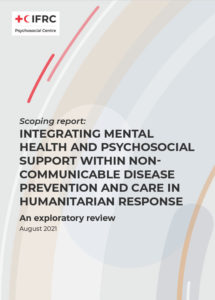This is the first time that the humanitarian community’s views and ideas on how to best integrate MHPSS and NCD prevention and treatment have been brought together – and these are summarised in this scoping report.
Anouk Boschma, PS Centre Technical Advisor and MHPSS Technical Advisor to this project and report
The Scoping report: Integrating Mental Health and Psychosocial Support Within Non-Communicable Disease Prevention and Care in Humanitarian Response explores whether and how mental health and psychosocial support (MHPSS) and non-communicable disease (NCD) prevention and care should be integrated in humanitarian response and settings. It explores the case for addressing mental ill-health and other NCDs in humanitarian response as well as the opportunities and barriers in doing so. This report also investigates how psychosocial support is an often-overlooked factor that needs greater consideration.
It is clearly the right time to consider how to act on this integration in the best manner. It requires a fundamentally different approach. A more holistic, person-centred and responsive to the many social and economic determinants of health in humanitarian settings, with a focus on prevention as well as treatment.
Anouk Boschma, PS Centre Technical Advisor and MHPSS Technical Advisor to this project and report
This scoping report is the final result of a knowledge generation and sharing project executed by the IFRC PS Centre with the Danish Red Cross International Department and the School of Global Health of the University of Copenhagen. It was funded by Novo Nordisk Foundation.
Additionally, Anouk is one of the instructors in a new massive open online course (MOOC), which was developed by the University of Copenhagen to bring greater attention to the project. The course combines academic information with best practices/challenges, to build knowledge, awareness and develop capacity of course participants. This is aimed both at country and programme managers (inside and outside the Movement) working with MHPSS and/or NCDs in humanitarian settings, and at university students and others with interest in the subject. The course adds to an existing MOOC on Non-Communicable Diseases in Humanitarian Settings that was launched following the 2018 bootcamp, on which 4,000 learners have enrolled to date.



